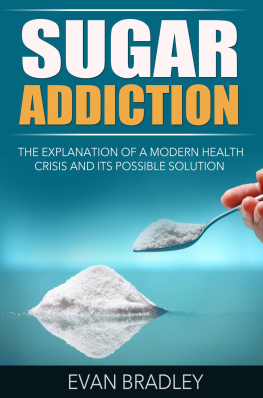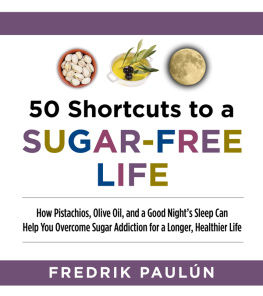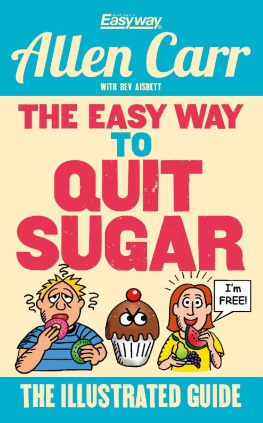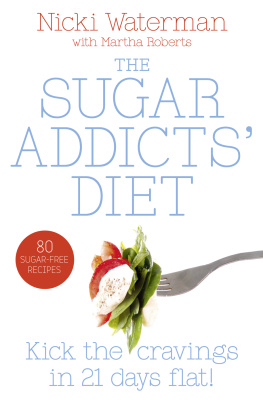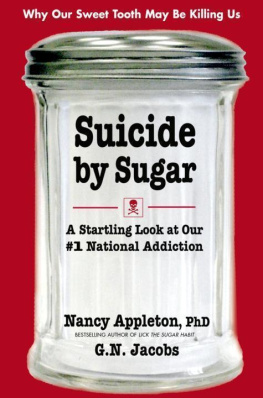Sugar Addiction
The Explanation of a Modern Health Crisis and Its Possible Solution
Evan Bradley
Copyright 2015 All rights reserved.
This document is geared towards providing exact and reliable information in regard to the topic and issue covered. The publication is sold with the idea that the publisher is not required to render accounting, officially permitted, or otherwise, qualified services. If advice is necessary, legal or professional, a practiced individual in the profession should be ordered.
In no way is it legal to reproduce, duplicate, or transmit any part of this document in either electronic means or in printed format. Recording of this publication is strictly prohibited and any storage of this document is not allowed unless with written permission from the publisher. All rights reserved.
The information herein is offered for informational purposes solely, and is universal as so. The presentation of the information is without contract or any type of guarantee assurance. Before beginning any new nutrition or exercise program it is recommended that you seek medical advice from your personal physician.
Table of Contents
Introduction
T here has been a lot of debate about the possible negative effects of dietary sugar on human health. In the last few decades a series of scientific studies have been undertaken with the same goal: to establish a connection between the increased intake of dietary sugar and several major health risks with obesity being a major focus.
The majority of those studies remove sugar intake from the context of overall human metabolism in which sugar is only one of three major nutrients used in energy production and the cells development processes. In addition, not one of those trials took psychological components into consideration when deriving a conclusion.
This results in a partial view and leaves wide space for speculation both affirmative and negative. Publicly accessible sources of information such as blog posts, reviews, reports and web articles as well as work done by prominent medical individuals are already using those partial studies and adjusting them to serve a bigger message.
With few exceptions, studies are conducted in a controlled environment using rodents as subjects. Subjects were exposed to a high dosage of sucrose (table sugar), high-fructose corn syrup and processed fructose in order to see its influence on the current metabolic status.
It is irrational to presume that the average consumer will deliberately expose their body to such high levels of dietary sugar over a longer period of time. It is also logical to assume that the same negative effects can be observed if we were to force large quantities of water onto rats instead of sugar. The conclusions from such a study just dont make sense.
One of the main goals of the research conducted for the development of this book was to distill hundreds of trials and studies in order to be able to observe them from an angle that would ultimately allow reaching logical and unbiased conclusions. In addition, all trials funded by the sugar industry were disregarded. The primary focus was on trials that included humans and where high-carbohydrate intake was only a part of the complete daily diet of men, women and children participating in those trials.
This book puts those studies in the context of the human metabolism as a whole while also taking into consideration the primary underlying instinctual and cognitive behaviors of the average consumer in terms of feeding habits. It avoids discussing the commonly known and does not argue current trading or production policies worldwide.
It does discuss most recently elevated concerns about the lipogenic[1] effect of dietary fructose, used in HFCS as a main sweetener of carbon beverages, soft drinks and other processed food in USA.
Those findings, along with the sum of all reviewed trials will be thoroughly explained in order to see if there is a real connection between dietary sugar and several suggested negative effects on human body.
These are the main concerns this book addresses:
- What role do carbohydrates have in a metabolism? How do they interact with proteins and lipids (fats) during the digestion and metabolic processes? Is there any significant difference in the metabolism of naturally occurring carbohydrates and dietary sugar?
- What is dietary sugar? What is refined sugar and how is it made? Is high-fructose corn syrup used in a processed food different from other types of dietary sugar from the perspective of its composition and influence on metabolic processes?
- How do you distinguish between naturally occurring sugar and added dietary sugar or low caloric sweetener by reading a products label?
- Can a diet rich in complex carbohydrates - dietary sugar in particular - affect those with genetic predisposition to obesity?
- To what extent does dietary sugar influence a sudden rise in a number of obese children and adults?
- Is there a connection between high intake of sugar with diabetes, cardiovascular diseases, metabolic syndrome and obesity?
These are some of the questions that will be answered in a first part of this work.
The second part of this book connects the conclusions derived from this analysis and puts them in the perspective of human psychology and cognitive behavior. It is essential to observe the problem through both physiological processes occurring during digestion and metabolism and the psychological influence of carbohydrates. As it will be demonstrated, sugar (carbohydrates), unlike fat and proteins, has an additional influence on the human body.
That influence cannot be diminished or eliminated through regulations or by suggesting sudden and radical changes in a lifestyle. While changes in lifestyle can indeed work for a small part of the population, the majority and that includes children cannot be effectively forced into making those changes.
Based on the principle that nothing that is forced on someone can yield a long term positive result, it is critical to develop an effective, yet not so radical solution for this large part of population.
The solution is simple, realistic and does not require any kind of drastic measures.
Chapter 1 - Inside Sugar
S ugar is an umbrella term for all carbohydrates, a sweet and soluble compound, naturally occurring and found in plants - regardless of origins[2] and type. It consists of carbon, oxygen and hydrogen (thus; carbohydrates), and many of them are used in food or as food. Carbohydrates are the main food source and essentially the primary source of energy for the body. That energy is used for the locomotive system as well as for the cells development.
For the sake of our argument we will only address monosaccharides (glucose and fructose) and disaccharides (sucrose, a table sugar consisting of glucose and fructose). As we will see, different types of sugar contain different ratios of those two compounds. One of these compounds is suspected to be a major factor in the elevation of plasma triglycerides levels, insulin resistance and the overall deposit of fat.
All of these concerns have come to light in the past few decades. Up until then, humans enjoyed the sweet tastes of their food without having any second thoughts.
Only in last 300 years did humans start to refine larger quantities of sugar from different plants. Before that, sugar was considered a luxury and was available only to those living in areas where sugarcane could thrive. Even in those areas, people could only chew the stem of the sugarcane plant in order to taste its sweetness.
For the most part, honey was the sweetener of the choice around the world.
Indians were the first who discovered the process of crystalizing sugar from sugarcane juice. In its crystalized form, sugar was easier to be stored and transported, both critical features for trading. With the establishment of naval trading routes and through migrations, sugar extraction technology became available outside of India and Asia. Columbus was the first who introduced the indigenous people of the West Indies to sugar and Spanish conquistadors did the same in Central and South America. In Europe, the technology was brought with the expansion of the Ottoman Empire.
Next page
